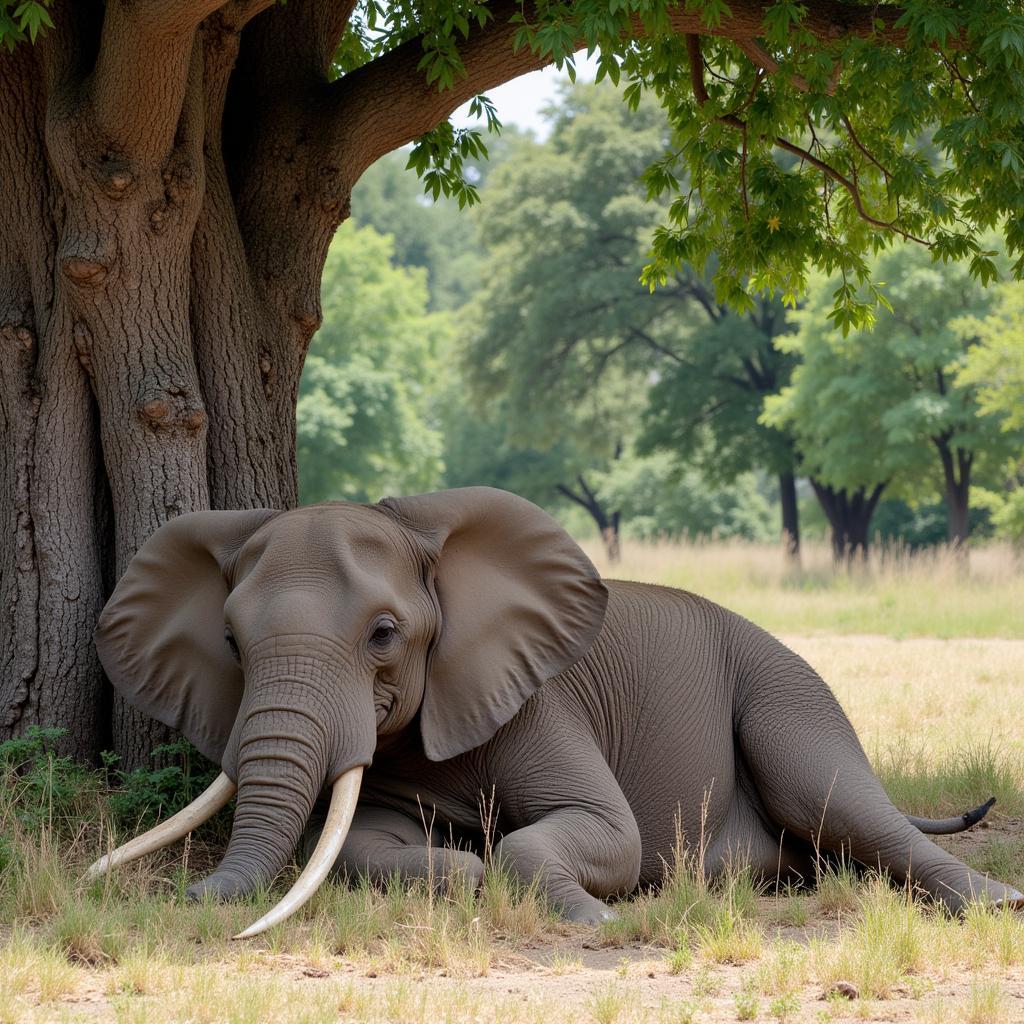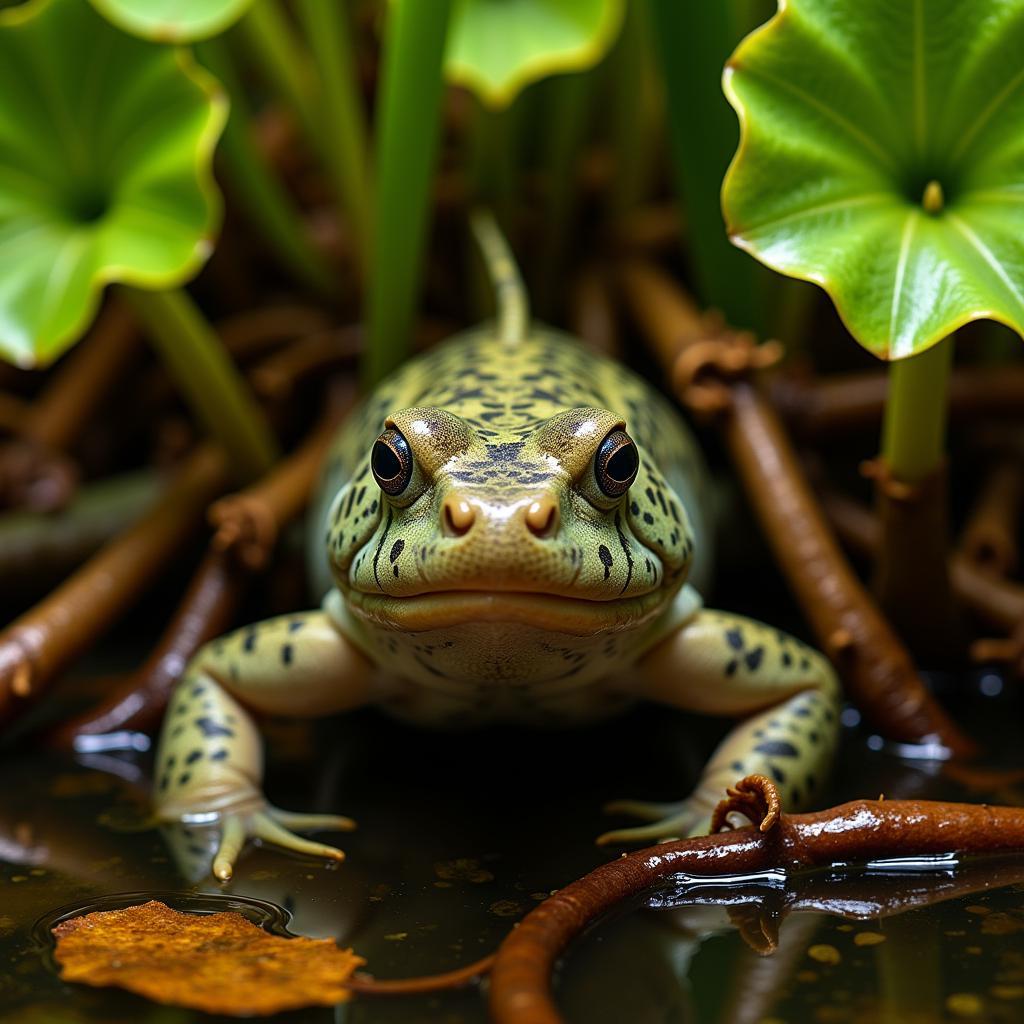Unveiling the Intriguing World of African Elephant Activities
African Elephant Activities are a fascinating window into the complex lives of these majestic creatures. From their social interactions to their vital role in shaping the African landscape, understanding their daily routines offers invaluable insights into the delicate balance of the African ecosystem.
Delving into the Daily Grind: Typical African Elephant Activities
African elephants, the largest land animals on Earth, lead lives filled with a diverse range of activities. These activities are essential not only for their individual survival but also for the health and balance of the African savanna.
- Foraging: A significant portion of an elephant’s day is dedicated to foraging. They consume vast quantities of vegetation, including grasses, leaves, bark, and fruits, playing a crucial role in shaping the landscape.
- Socializing: Elephants are highly social animals, living in complex matriarchal herds. Their interactions, including touching trunks, communicating through low-frequency rumbles, and caring for young calves, demonstrate the strong bonds within the herd.
- Drinking and Bathing: Water is vital for elephants. They drink large amounts daily and frequently wallow in mud and water to cool down and protect their skin from parasites.
- Resting: Despite their size, elephants are surprisingly agile and active. However, they also require periods of rest to conserve energy and recover.
The african game lodge offers incredible opportunities to witness these magnificent creatures in their natural habitat.
The Importance of Understanding African Elephant Activities
Studying african elephant activities offers more than just a glimpse into their daily lives. It provides valuable data for conservation efforts and contributes to a deeper understanding of the African ecosystem. Researchers analyze these activities to monitor elephant populations, assess habitat health, and develop effective conservation strategies.
- Conservation Implications: Understanding elephant behavior allows conservationists to identify potential threats and develop targeted interventions. For instance, changes in foraging patterns can indicate habitat degradation or human encroachment.
- Ecosystem Impact: Elephants play a vital role in shaping the savanna. Their foraging activities create open spaces, promoting biodiversity and supporting other species. Their dung also disperses seeds, contributing to forest regeneration.
What Influences African Elephant Activities?
Several factors influence the daily routines of African elephants. These factors range from environmental conditions to social dynamics within the herd.
- Seasonal Changes: Rainfall patterns and temperature fluctuations significantly impact the availability of food and water, influencing elephant movements and foraging behavior.
- Social Hierarchy: The matriarch, the oldest and most experienced female in the herd, plays a crucial role in decision-making, guiding the herd’s movements and activities.
Dr. Anika Sharma, a renowned wildlife biologist specializing in African elephant behavior, explains, “Understanding the intricacies of elephant social dynamics is key to comprehending their activities. The matriarch’s leadership influences everything from foraging patterns to migration routes.”
The Curious Case of the African Indian Elephant Tube: A Unique Activity?
While not a naturally occurring activity, the existence of videos and discussions surrounding “African Indian Elephant Tube” highlights the public’s fascination with these animals. This also emphasizes the importance of responsible wildlife viewing and the ethical considerations of capturing and sharing animal footage.
 An African elephant resting, showcasing its need for downtime despite its active lifestyle.
An African elephant resting, showcasing its need for downtime despite its active lifestyle.
What do African elephants do for fun?
African elephants engage in various activities that could be considered “fun” or play. These include:
- Dust Bathing: Throwing dust and dirt over themselves, not only for protection but also seemingly for enjoyment.
- Playing with Water: Spraying water with their trunks, especially younger elephants, often appears playful.
- Sparring: Young males engage in playful sparring to develop social skills and establish dominance hierarchies.
Professor Jabari Mosi, an expert in African elephant communication, notes, “Observing elephant play provides insights into their social development and the complex ways they interact with their environment.”
Conclusion: The Ongoing Fascination with African Elephant Activities
African elephant activities, from their daily foraging routines to their complex social interactions, offer a captivating glimpse into the lives of these magnificent creatures. Understanding these activities is not just about appreciating their intelligence and social complexity; it’s also crucial for their long-term survival and the preservation of the African ecosystem. Continued research and responsible tourism can help ensure that future generations can continue to marvel at the intricate world of African elephant activities. Did you know an african elephant price can vary greatly depending on several factors?
FAQ
- What do African elephants eat? African elephants are herbivores, consuming a wide variety of vegetation.
- How long do African elephants live? African elephants typically live for 50-70 years in the wild.
- How much do African elephants weigh? Adult African elephants can weigh up to 6,000 kg (13,200 lbs).
- How big are African elephant herds? Herd size varies, but can range from a few individuals to several dozen.
- How do African elephants communicate? They communicate through a variety of vocalizations, including rumbles, trumpets, and roars, as well as through body language and scent.
- Why are African elephants important to the ecosystem? They play a crucial role in shaping the landscape, promoting biodiversity, and dispersing seeds.
- What are the main threats to African elephants? Habitat loss, poaching for ivory, and human-wildlife conflict are major threats.
Have you heard this african elephant joke? It highlights the gentle giants’ playful nature. The east african great rift valley is a significant geographical feature in Africa, and it’s interesting to note how elephant activities adapt to such terrains.
For further support, please contact us at Phone: +255768904061, Email: kaka.mag@gmail.com or visit us at Mbarali DC Mawindi, Kangaga, Tanzania. Our customer service team is available 24/7.

